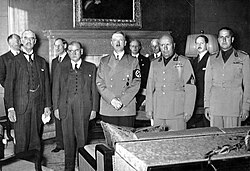Hello everybody, my name is Neville Chamberlain and I was a British Conservative politician and served as the Prime Minister of Great Britain from May 1937 to May 1940. I would say that I’m best known for my appeasement foreign policy. The best example of this would be in 1938 at the Munich Conference, when I signed the agreement allowing Nazi Germany to take to the Sudetenland from Czechoslovakia. But what can I say?! I believe that in order for peace to be achieved here in Europe, you’ve got to make the angry people happy. I would say that that is a perfectly logical reason to give the Sudetenland to Germany, wouldn’t you? Anyway, I will get into my political life later. I will first begin this blog by telling you my background. I was born to my father, Joseph Chamberlain in Birmingham, England. I was educated in Rugby School and was later sent to Mason Science College. However, I had very little interest in the sciences. So, in a very short amount of time, I left that boring school. Fortunately, my father apprenticed me to a firm of accountants. Within about half of a year, I became a salaried employee. I wasn’t getting paid much, but hey, it was a start. Although my father was an accomplished man whom I respect very much, there are some things that he did (rather, made me do) that upset me quite a bit. For example, in order to recover our faulty family fortune, my father sent me to the Bahamas to establish a sisal plantation. Although the scenery was very beautiful and extremely different from Britain, I very much desired to return back to my homeland. I ended up spending six years on the island, and the plantation ended up being a failure. In addition to my wastage of six years, my father lost about fifty thousand pounds. Sigh -__- On my return to England, I entered in business by purchasing Hoskins & Company, a manufacturer of metal ship berths. I served as the managing director there for about seventeen years. During my seventeen years with the company, Hoskins & Company prospered. Perhaps due to the fact that they were under my direction, I’m not sure :). At the same time, I was also involving myself in civic activities in Birmingham. In 1910, I met the love of my life, Anne Cole. From the moment I saw her, I knew she would be the one for me. We married the following year and we both had one son and one daughter. That’s pretty much my background life, outside of politics. My story of how I entered politics is quite an interesting one. Initially, I showed very little interest in politics, even though my father was in Parliament. I thought it was extremely boring, even more so than the sciences that I studied for a short time at Mason Science College. During the “Khaki Election” of 1900, however, I realized that in politics was how I wanted to spend the rest of my life. During the election, I made speeches in support of my father’s Liberal Unionists. The following year, I successfully stood as the Liberal Unionist for the Birmingham City Council. The rest of my political life grew from there. Well, now that you have a little bit of my background, hopefully the rest of my blog will make a little bit more sense for those who desire to read it :).

"The Right Honourable Arthur Neville Chamberlain" I like that title :)
 Over the radio, telling my nation that we were now at war. It was a difficult thing to do.
Over the radio, telling my nation that we were now at war. It was a difficult thing to do. Hitler and I after the Munich Conference
Hitler and I after the Munich Conference

 Look at how happy I am! :)
Look at how happy I am! :)